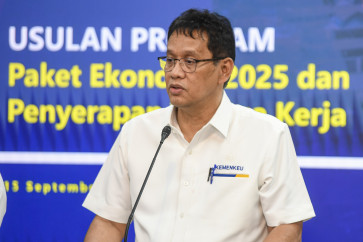Popular Reads
Top Results
Can't find what you're looking for?
View all search resultsPopular Reads
Top Results
Can't find what you're looking for?
View all search resultsMany firms still keep export earnings overseas
Many domestic companies are still ignoring a Bank Indonesia regulation that requires them to keep their export earnings in local banks
Change text size
Gift Premium Articles
to Anyone
M
any domestic companies are still ignoring a Bank Indonesia regulation that requires them to keep their export earnings in local banks.
BI executive director for report management and compliance, Wiwiek Sisto Widayat, said that at least 20 percent of the country's export earnings (DHE) were not reported and still kept in offshore banks despite the issuance of the regulation in 2011.
'Implementation of the regulation was carried out in January 2012. From January 2012 to September 2014, the reporting had only covered 80 percent of our total exports,' he said.
At present, a majority of oil and gas firms still prefer to deposit their earnings in offshore bank accounts, even though three domestic banks have obtained trustee business permits, namely Bank Negara Indonesia (BNI), Bank Rakyat Indonesia (BRI) and Bank Mandiri.
Wiwiek said that the central bank had met with the Finance Ministry, Energy and Mineral Resources Ministry and Upstream Oil and Gas Regulatory Special Task Force (SKKMigas) to set up a technical team to monitor the earnings and their reporting.
'It is important because the inflow of earnings may help stabilize the rupiah and become one of the funding sources to spur economic growth,' he said.
Data from BI showed that total exports during January 2012 to September 2014 reached US$497.8 billion, while the amount of earnings reported stood only at $398.5 billion. But, the 80 percent figure was higher compared to the 65 percent that BI recorded during the regulation's early implementation.
Gold, crude palm oil (CPO) and rubber were listed as the three export sectors with the highest reporting rates as they stood at 97 percent, 95 percent and 95 percent, respectively.
On the other hand, liquefied natural gas (LNG), metal and rattan were recorded as the sectors with the lowest rates; 53 percent, 58 percent and 50 percent.
Overall, reporting of export earnings in the non-oil and gas segment accounted for 82 percent, while oil and gas accounted to 67 percent.
Wiwiek attributed the lack of classified domestic trustee banks as one of the reasons behind the low participation of oil and gas firms in reporting their export earnings.
Commenting on the low participation of oil and gas firms, Standard Chartered Bank Indonesia economist Fauzi Ichsan said that BI should look into existing contracts owned by the companies.
'BI must find out the real reason. It may just be that their contracts, which were formulated with the government, prevent them from depositing their earnings onshore,' he said during a telephone interview.
It is also possible that the contracts are based on a higher legal basis than a BI regulation, and thus such basis may leave BI's effort meaningless, according to Fauzi.
He said that any attempt to hold or control the earnings onshore would be against Indonesia's free capital movement principle.










